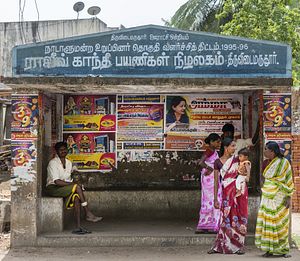The summer of 2016 in India will see Indian politics heat up as the southern state of Tamil Nadu prepares for its State Assembly polls which are coming up soon starting May 16.
This election has been a challenge for the Election Commission (EC), which has attempted to institute some new reforms and keep older ones afloat—including the strict implementation of the ban on large-sized election hoardings, regulating of campaign expenditures, opening 700 more polling booths across the state, and even keeping up the new rule on the mandatory filing of ‘no dues’ affidavits (from the suppliers of power, water, telephone, and drainage management organizations) by all nominees.
Poll awareness campaigns have an even larger media presence this year and have gone on to include even flash mobs at public places to remind people to cast their votes. Officers of the Indian Administrative Services (IAS) and Indian Police Services (IPS) were transferred to different constituencies based on petitions in order to avoid abuse of power due to entrenched loyalties.
In addition to this, the EC has attempted to increase the number of migrant workers who vote this year, stressing their stakes and ensuring that the industries that employ them all provide the chance for them to register in the polls.
However, this election is a landmark for more reasons than just these. Politics in Tamil Nadu has traditionally been a struggle between the two main State Parties—the Dravida Munnetra Kazhagam (DMK) with five-time ex-Chief Minister M Karunanidhi at its head and the All India Anna Dravida Munnetra Kazhagam (AIADMK) with current Chief Minister, J Jayalalithaa at its head.
Parties in Tamil Nadu have traditionally also heavily campaigned on the grounds of caste and language. Tamil is a prominent state language, whose cultural preservation has been of immense importance to state parties, especially during anti-Hindi protests at different points (most notably at their peak in the 1960s, when the central government attempted to make Hindi the sole official language of the Indian state).
The decline of prominent national parties and alliances in Tamil Nadu, who have a stronghold at the center in New Delhi, can be traced back to around this same period, and the ongoing battles between the DMK and AIADMK have taken the forefront ever since.
The DMK lost power in the 2011 elections after being associated with high-profile corruption charges, causing the AIADMK to reign for the past five years. During her tenure, Jayalalithaa was temporarily disqualified from her position in public office due to the resurfacing of a disproportionate assets case against her in September 2014 but she was reinstated in office by May 2015.
This instance, coupled with much criticism against her management of the Tamil Nadu floods of December 2015, have caused much speculation about whether she has the ability to come back to office in the 2016 elections.
With the shadow of abuse of public office looming large above the two most prominent parties, this election has seen an incredible rise in the presence of smaller parties and even independents in some constituencies—causing the number of candidates to almost double in the fight for 234 seats.
The lead-up to the filing of nominations saw a nearly daily change in the candidates fielded by each of these alliances, with defections occurring across parties by members who were unhappy with the conflicting aims of some within the alliance, particularly within the third front.
The Bharatiya Janata Party (BJP), which is ruling at the center, while not affiliated with any of these four groups this time, is continually attempting to mobilize a strong presence for itself—complete with the proliferation of voice messages from Prime Minister Narendra Modi himself.
It has managed to even find a strong presence in the opinion polls of April 2016, which also revealed that the AIADMK seems to be losing its traditional stronghold of western Tamil Nadu to the DMK and has been edged to third position by the Third Front, the Pattali Makkal Katchi (PMK), and the BJP in a couple of constituencies.
It remains to be seen what this means for the party at the center, with neither the incumbent AIADMK keen on an alliance, nor any show of solidarity extended by the DMK, which has allied itself with BJP’s main national opposition, the Congress.
The PMK’s lead does not seem to be forthcoming in any of the constituencies. And with another alliance of smaller parties comprising a breakaway faction of the Congress, it is unclear what will happen if the situation arises where a party will have to ally with the BJP to form a coalition post-election.

































